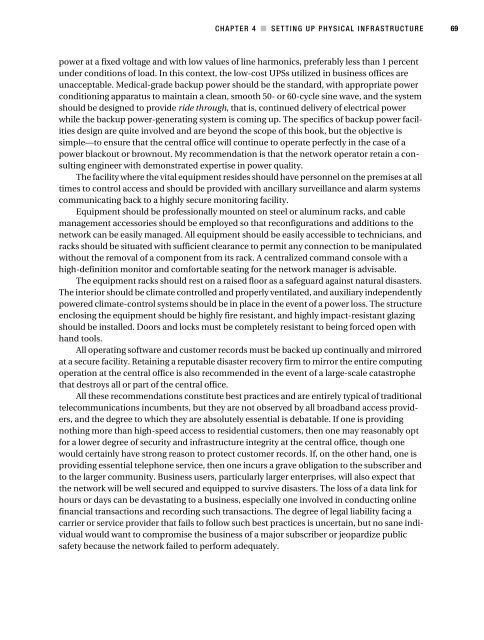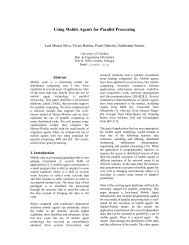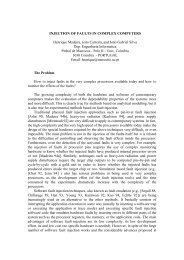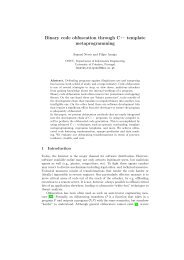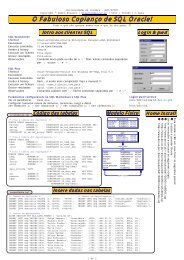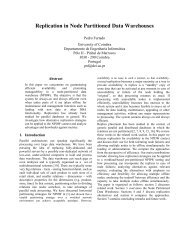WiMax Operator's Manual
WiMax Operator's Manual
WiMax Operator's Manual
Create successful ePaper yourself
Turn your PDF publications into a flip-book with our unique Google optimized e-Paper software.
CHAPTER 4 ■ SETTING UP PHYSICAL INFRASTRUCTURE 69<br />
power at a fixed voltage and with low values of line harmonics, preferably less than 1 percent<br />
under conditions of load. In this context, the low-cost UPSs utilized in business offices are<br />
unacceptable. Medical-grade backup power should be the standard, with appropriate power<br />
conditioning apparatus to maintain a clean, smooth 50- or 60-cycle sine wave, and the system<br />
should be designed to provide ride through, that is, continued delivery of electrical power<br />
while the backup power-generating system is coming up. The specifics of backup power facilities<br />
design are quite involved and are beyond the scope of this book, but the objective is<br />
simple—to ensure that the central office will continue to operate perfectly in the case of a<br />
power blackout or brownout. My recommendation is that the network operator retain a consulting<br />
engineer with demonstrated expertise in power quality.<br />
The facility where the vital equipment resides should have personnel on the premises at all<br />
times to control access and should be provided with ancillary surveillance and alarm systems<br />
communicating back to a highly secure monitoring facility.<br />
Equipment should be professionally mounted on steel or aluminum racks, and cable<br />
management accessories should be employed so that reconfigurations and additions to the<br />
network can be easily managed. All equipment should be easily accessible to technicians, and<br />
racks should be situated with sufficient clearance to permit any connection to be manipulated<br />
without the removal of a component from its rack. A centralized command console with a<br />
high-definition monitor and comfortable seating for the network manager is advisable.<br />
The equipment racks should rest on a raised floor as a safeguard against natural disasters.<br />
The interior should be climate controlled and properly ventilated, and auxiliary independently<br />
powered climate-control systems should be in place in the event of a power loss. The structure<br />
enclosing the equipment should be highly fire resistant, and highly impact-resistant glazing<br />
should be installed. Doors and locks must be completely resistant to being forced open with<br />
hand tools.<br />
All operating software and customer records must be backed up continually and mirrored<br />
at a secure facility. Retaining a reputable disaster recovery firm to mirror the entire computing<br />
operation at the central office is also recommended in the event of a large-scale catastrophe<br />
that destroys all or part of the central office.<br />
All these recommendations constitute best practices and are entirely typical of traditional<br />
telecommunications incumbents, but they are not observed by all broadband access providers,<br />
and the degree to which they are absolutely essential is debatable. If one is providing<br />
nothing more than high-speed access to residential customers, then one may reasonably opt<br />
for a lower degree of security and infrastructure integrity at the central office, though one<br />
would certainly have strong reason to protect customer records. If, on the other hand, one is<br />
providing essential telephone service, then one incurs a grave obligation to the subscriber and<br />
to the larger community. Business users, particularly larger enterprises, will also expect that<br />
the network will be well secured and equipped to survive disasters. The loss of a data link for<br />
hours or days can be devastating to a business, especially one involved in conducting online<br />
financial transactions and recording such transactions. The degree of legal liability facing a<br />
carrier or service provider that fails to follow such best practices is uncertain, but no sane individual<br />
would want to compromise the business of a major subscriber or jeopardize public<br />
safety because the network failed to perform adequately.


